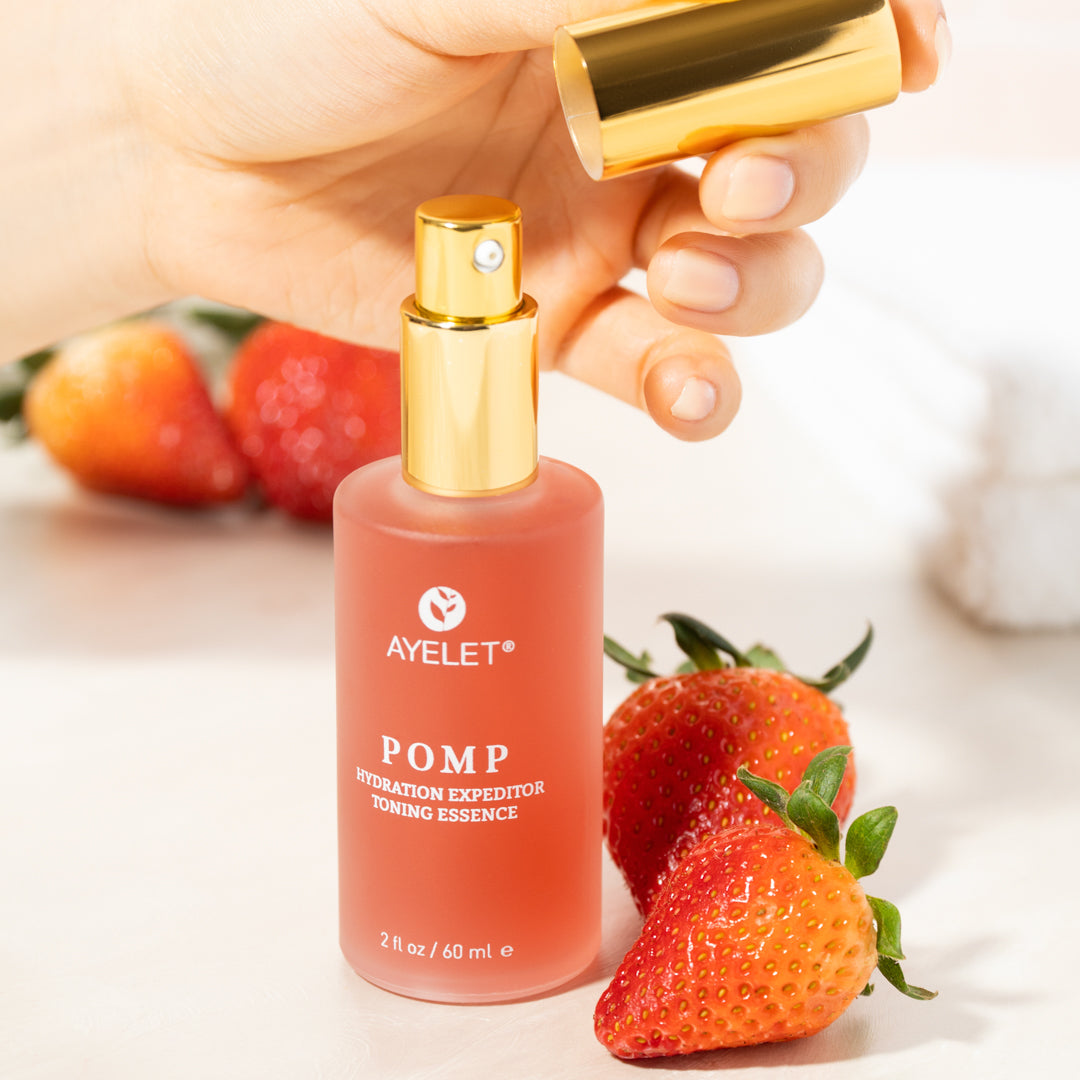Embracing the Menopause Journey: From Hormones to Holistic Skincare
Menopause is a natural, yet often misunderstood, stage of life that marks the end of menstruation. Despite its universality, there is still a stigma surrounding open discussions about menopause and its symptoms. This blog aims to break that silence, offering an in-depth exploration of the physiological changes, hormonal shifts, and ways to support the body during perimenopause, menopause, and post-menopause. We will also delve into the science of glycation, its impact on aging skin, and effective ways to mitigate its effects. Finally, we will highlight the power of herbs and skincare in nurturing the body and skin through this phase.
Menopause occurs when the ovaries cease producing eggs and hormone levels—primarily estrogen and progesterone—decline significantly. This hormonal shift begins in perimenopause, which can start years before menstruation ends. Symptoms may include:
-
Hot Flashes and Sweats: Sudden temperature changes caused by fluctuating estrogen levels.
-
Mood Swings and Anxiety: Changes in serotonin levels linked to hormonal fluctuations.
-
Sleep Disturbances: Often due to night sweats or decreased progesterone, a calming hormone.
-
Vaginal Atrophy: Vaginal atrophy refers to the thinning, drying, and loss of elasticity in the tissues of the vagina and urethra. This condition can cause discomfort or pain during intimacy and increase the likelihood of developing conditions such as vaginal inflammation, urinary tract infections, and bladder issues.
- Skin Changes: Reduced estrogen affects collagen production, leading to dryness, sagging, and increased fine lines.
-
Bone Density Loss: Lower estrogen levels can result in weaker bones and an increased risk of osteoporosis.
- Hair Growth: Hormonal shifts during menopause may lead to noticeable changes in hair growth, including increased facial hair and a reduction in hair thickness or density on the scalp.
Understanding these changes can empower women to seek support and solutions without shame or hesitation.
Psychological Impact of Menopause
The transition into menopause can have profound psychological effects. Women may experience mood swings, anxiety, depression, and feelings of loss or inadequacy. These emotions often stem from hormonal changes as well as societal pressures and misconceptions about aging. It’s important to acknowledge these feelings and seek support from friends, family, or mental health professionals. Open conversations and education can help normalize the emotional aspects of menopause, reducing stigma and isolation.
How Long Does Menopause Last?
Menopause itself is a single point in time—the 12-month anniversary of a woman’s last menstrual period. However, the transitional phases of perimenopause and post-menopause can last for years. Perimenopause often begins in a woman’s 40s and can last 4-10 years, while post-menopause continues for the rest of a woman’s life. During these stages, symptoms may wax and wane, requiring ongoing adjustments in self-care and medical support.
Bone Loss, Osteoporosis, and Menopause
Estrogen plays a crucial role in maintaining bone density. As estrogen levels decline during menopause, women are at an increased risk of developing osteoporosis. This condition causes bones to become weak and brittle, making fractures more likely. To protect bone health, women should:
-
Seek Information and Screenings: Talk to healthcare providers about bone density tests and osteoporosis prevention.
-
Incorporate Calcium, Magnesium, K2, and Vitamin D: These nutrients are essential for strong bones.
-
Exercise Regularly: Weight-bearing and resistance exercises strengthen bones.
- Meditation can be highly beneficial both for preventing the symptoms of menopause and for women who are already going through it. Here’s how it helps:
For Preventing Menopause Symptoms:
-
Regulates Hormones:
- Meditation helps balance the body's stress response, which can indirectly help in regulating hormonal fluctuations that might contribute to early menopause. Lowering stress hormones (like cortisol) can help maintain hormonal equilibrium as you age.
-
Promotes Healthy Sleep:
- Many women face sleep disruptions before and during menopause. Meditation can promote deep relaxation and better sleep quality, which is crucial for hormone regulation and overall well-being during this time.
-
Emotional Resilience:
- Meditation fosters mindfulness and emotional regulation. This can help prevent emotional imbalances that may lead to mood swings or anxiety, which are common during the hormonal changes leading up to menopause.
-
Mind-Body Connection:
- Meditation can help women connect more deeply with their bodies and develop a sense of acceptance and understanding of the natural changes that come with aging. This connection can support more positive mental and emotional health, potentially mitigating symptoms like hot flashes or irritability.
For Women Already Experiencing Menopause:
-
Alleviated Hot Flashes and Night Sweats:
- Meditation has been shown to help reduce the frequency and severity of hot flashes and night sweats by regulating the body’s temperature control and improving emotional regulation.
-
Reduces Anxiety and Depression:
- Many women experience anxiety, depression, or mood swings during menopause due to hormonal changes. Meditation can significantly reduce anxiety and improve overall mood by promoting relaxation and creating a sense of calm.
-
Improves Sleep Quality:
- Sleep disturbances are common during menopause, but meditation can help calm the mind, alleviate stress, and improve overall sleep patterns, which is vital for hormone balance and overall health.
-
Helps with Cognitive Function:
- Meditation enhances focus, memory, and mental clarity, helping with the cognitive changes that some women experience during menopause, often referred to as “brain fog.”
-
Supports Bone Health:
- Regular meditation can help reduce stress levels and inflammation, which indirectly supports bone health during menopause, especially when paired with a healthy diet and exercise.
-
Balances Emotional Health:
- Menopause can trigger emotional and mood-related challenges, but mindfulness practices can help regulate emotions, making it easier to cope with the changes that menopause brings.
-
Improves Physical Well-being:
- Meditation helps relax the body, reducing symptoms like joint pain or muscle tension, which can sometimes worsen during menopause due to hormonal shifts.
-
Use a Weighted Vest: Wearing a weighted vest during physical activities adds resistance, stimulating bone growth and helping to maintain bone density. This simple yet effective tool can be especially beneficial in preventing osteoporosis.
- Consider Hormone replacement therapy (HRT), (BHRT) - Bio Identical Hormone Therapy, or other medications may be appropriate for some women.
The Role of Glycation in Skin Aging
Glycation is a process where excess sugars bind to proteins and lipids, forming advanced glycation end-products (AGEs). These AGEs damage collagen and elastin, the proteins that keep skin firm and supple. Glycation accelerates aging, leading to:
-
Loss of skin elasticity
-
Formation of deep wrinkles
-
A dull and uneven complexion
To avoid glycation, adopt a diet low in refined sugars and high in antioxidants. Foods like berries, leafy greens, and nuts can neutralize free radicals and reduce glycation effects.
Herbal Allies for Menopause
Herbs have been used for centuries to support hormonal balance and alleviated menopause symptoms. Here are some scientifically backed options:
Black Cohosh: Known for reducing hot flashes and night sweats by modulating estrogen receptors.
Red Clover: Contains phytoestrogens that mimic estrogen, easing menopausal discomforts.
Ashwagandha: An adaptogen that helps reduce stress and improve sleep quality.
Dong Quai: Often called the “female ginseng,” it supports hormonal balance and circulation.
Shatavari - A powerful adaptogen that is essential for supporting hormonal balance
Evening Primrose Oil: Rich in gamma-linolenic acid (GLA), it aids in reducing skin dryness and inflammation.
Incorporating these herbs through teas, supplements, or skincare products can provide holistic support during menopause.
Embracing Menopause with Confidence
Menopause is not an end but a transition into a new phase of life. By understanding the physiological and psychological changes and supporting your body with proper nutrition, herbs, and skincare, you can navigate this journey with grace and confidence. Speak openly about your experiences, seek support, and remember that menopause is a natural and powerful part of being a woman.
For more information on Ayelet Opulence Cream and other nurturing skincare solutions, visit Ayelet Naturals. This luxurious cream contains Engelhardtia Chrysolepis, and Dipalmitoyl hydroxyproline both promoting healthier, more resilient skin, here is how they work:
Dipalmitoyl Hydroxyproline
○ Collagen Boosting: Promotes collagen synthesis, essential for maintaining skin elasticity and firmness, particularly beneficial for mature skin as collagen production naturally declines with age.
○ Moisture Retention: Enhances skin hydration by strengthening the skin barrier and preventing moisture loss.
○ Firming Effect: Tightens and smooths the skin, giving it a more youthful and toned appearance.
○ Anti-Glycation Properties: Combats glycation by protecting collagen fibers from damage caused by advanced glycation end-products (AGEs), reducing skin aging linked to sugar-induced damage.
Engelhardtia Chrysoleepis Leaf Extract
A wild plant extract has several skin care benefits, including:
○ Antioxidant Properties: The extract contains antioxidant compounds that can help protect skin from free radicals and environmental stressors.
○ Firmness and Resiliency: The extract can help maintain skin's firmness and resiliency.
○ Water Loss Resistance: The extract can strengthen the skin's barrier to help it resist water loss.
○ Glycation Interruption: The extract can help interrupt a process known as glycation.
○ Wrinkle Reduction: The extract can help reduce wrinkles by boosting skin's elasticity and redefining skin contours.
○ Anti-inflammatory: The extract contains compounds that have anti-inflammatory properties.
Suitable for all women, this cream nurtures the skin through all life stages, making it an excellent choice regardless of age.
Conclusion
Menopause is a journey that every woman will experience in her own unique way. It is a time of change, growth, and resilience. By embracing this stage with knowledge, self-care, and open dialogue, women can transform the challenges of menopause into opportunities for empowerment and self-discovery. Whether it’s through nourishing the body with healthy foods, engaging in regular exercise, or finding solace in herbal and skincare remedies, there are countless ways to support yourself during this transition. Remember, menopause is not the end of vitality but the beginning of a vibrant, new chapter in life.
In Opulence Cream, Dipalmitoyl hydroxyproline works synergistically with Engelhardtia Chrysolepis to protect against glycation while nourishing the skin. This dual action makes the cream an effective choice for women at any age who want to maintain radiant, youthful skin. By incorporating such potent actives, the cream not only addresses aging concerns during menopause but also provides preventative care for younger women aiming to protect their skin from future damage.


